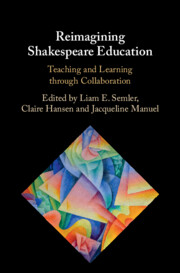Book contents
- Reimagining Shakespeare Education
- Reimagining Shakespeare Education
- Copyright page
- Dedication
- Contents
- Figures
- Tables
- Notes on Contributors
- Acknowledgements
- Introduction
- Part I Reimagining Shakespeare with/in Schools
- Part II Reimagining Shakespeare with/in Universities
- Part III Public Reimaginings
- Part IV Digital Reimaginings
- Part V Reimagining Performance
- Introduction
- Chapter 17 Flute Theatre, Shakespeare and Autism
- Chapter 18 The Viola Project
- Chapter 19 ‘All Corners Else o’th’Earth Let Liberty Make Use Of’
- Chapter 20 Teaching Shakespeare in Oman
- Chapter 21 Edward’s Boys in the South of France
- Afterword
- Index
- References
Chapter 19 - ‘All Corners Else o’th’Earth Let Liberty Make Use Of’
The Shakespeare Prison Project
from Part V - Reimagining Performance
Published online by Cambridge University Press: 02 February 2023
- Reimagining Shakespeare Education
- Reimagining Shakespeare Education
- Copyright page
- Dedication
- Contents
- Figures
- Tables
- Notes on Contributors
- Acknowledgements
- Introduction
- Part I Reimagining Shakespeare with/in Schools
- Part II Reimagining Shakespeare with/in Universities
- Part III Public Reimaginings
- Part IV Digital Reimaginings
- Part V Reimagining Performance
- Introduction
- Chapter 17 Flute Theatre, Shakespeare and Autism
- Chapter 18 The Viola Project
- Chapter 19 ‘All Corners Else o’th’Earth Let Liberty Make Use Of’
- Chapter 20 Teaching Shakespeare in Oman
- Chapter 21 Edward’s Boys in the South of France
- Afterword
- Index
- References
Summary
A director who has facilitated Shakespeare programmes in prisons for fifteen years in conversation with a former prisoner who served eighteen years and who participated in four of those programmes. The authors explore the ways in which performative Shakespeare programmes fill a niche otherwise unoccupied in the prison system – a recreational programme that offers opportunities for collaboration, growth and the development of empathic and communication skills that are not constrained by a deficit-based and outcome-oriented pedagogy. The programme offers models of camaraderie and support that are not ‘in opposition to’ other groups, and promotes collaborative over individual achievement. The development of intrinsic motivation is a key component in functioning as a free citizen, but is actively discouraged by the correctional system. Prison Shakespeare programmes develop these skills in addition to offering a practical critique to the model of ‘toughness’ promoted by the prisoners’ own cultural milieu. The chapter speaks to the value of recreation for its own sake, and how it can be a vital component in both education and rehabilitation precisely because it does not set out to do either.
- Type
- Chapter
- Information
- Reimagining Shakespeare EducationTeaching and Learning through Collaboration, pp. 295 - 306Publisher: Cambridge University PressPrint publication year: 2023

